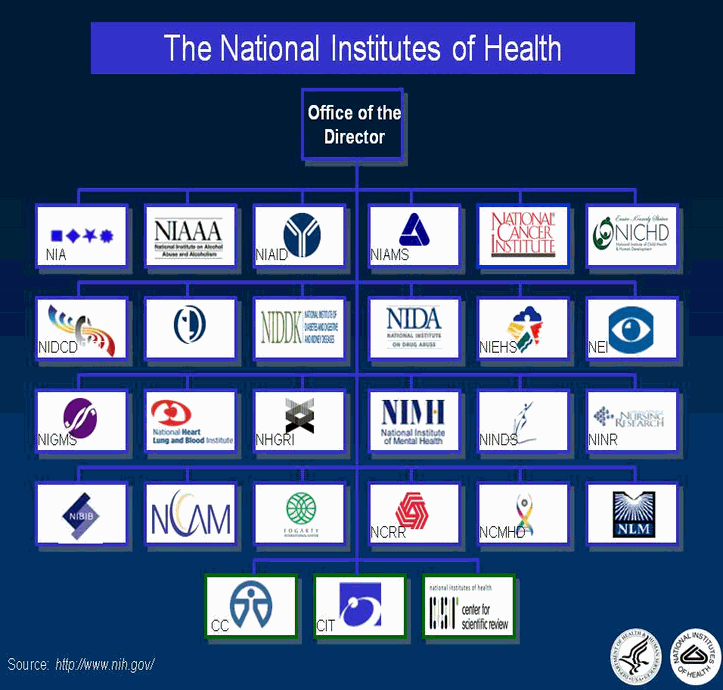|
|
|
|
|
|
|
News & Views item - May 2013 |
![]() US Sequestration and the Biomedical Labs. (May 22, 2013)
US Sequestration and the Biomedical Labs. (May 22, 2013)
Jocelyn Kaiser has just reported in ScienceInsider the initial effects on NIH biomedical research spending of the funding cuts brought on by the US federal government's March 1, 2013 "sequestration" (the Budget Control Act of 2011). The overall extent of the funding reduction is estimated to be something over US$85 billion for the US 2013 fiscal year, 50% of which will be defence spending.
For openers, sequestration this year has cut US$1.55 billion from the National Institutes of Health's (NIH's) budget. NIH Director Francis Collins told a Senate hearing last week that sequestration "has already dealt a devastating blow."

However, when specifying the damaging effects there are difficulties according to Science's Ms Kaiser. For example: "many grantees won't receive good or bad news about their proposals until later in the fiscal year that ends 30 September.
Howard Garrison, deputy executive director for policy at the Federation of American Societies for Experimental Biology says: "People are feeling a lot of pain, but to actually put it on sequestration versus other pressures on the budget, we're only guessing. At the individual level it's hard to say what the actual source is."
Listed in NIH cuts so far: New and competing grants are going down by 703, from 8986 which translates to the success rate which may drop from 18% in 2012 to 16%, according to Senator Tom Harkin (D-IA), chair of the Senate spending subcommittee that discussed NIH's 2014 budget request last week.
Stephen Desiderio, director of the Institute for Basic Biomedical Sciences at Johns Hopkins University in Baltimore, Maryland in regarding the effect of sequestration said: "If we have this conversation a year from now, we'll know the damage, but it won't be news."
Yale University neuroscientist Daniel Colon-Ramos.told Ms Kaiser that one consequence of the shrinkage of funding may be that some lab chiefs may hire more graduate students and fewer postdocs because new grad students usually bring a training grant with them and so are cheaper, but one over reaching fear was noted by Francis Collins -- the message it sends to young scientists. In testimony last week, he quoted a former student who is finishing a Ph.D at MIT. She's seen her role models struggle with funding: "I can't erase the fear that this is my future."
And Dr Collins added: "We're putting an entire generation of U.S. scientists at risk. If they go away, they won't come back."
Story Landis, director of the National Institute of Neurological Disorders and Stroke also painted a grim picture: "We may make it through this year, but if it continues it is Armageddon." And Dr Collins estimated that if the Obama administration and Congress don't find a way to avert more planned sequester cuts, NIH could lose US$19 billion over 10 years.
Below is ScienceInsiders assessment "on possible impacts at some of the largest NIH programs":
Although a cancer center with a $10 million NCI
institutional grant will take a $650,000 hit, [Harold] Varmus says larger
institutions such as Sloan-Kettering, his previous institution, can dig into
other resources to make up the gap. Smaller ones will suffer more, Varmus
says. Barbara Stewart, executive director of the Association of American
Cancer Institutes, also expects cutbacks in shared resources such as cell
sorting machines and tissue banks.
The three large, NIH-funded genome sequencing centers
have been downsizing since 2011
as part of a shift to clinical genomics at the National Human Genome
Research Institute. They will not be cut further because of the sequester,
says NHGRI spokesperson Larry Thompson.
The Clinical and Translational Science Awards, large
grants that support research at 60 medical centers, are still in limbo.
Those with ongoing multiyear grants are waiting to find out if some of a 10%
cut they received earlier this year will be restored, says Bradley Evanoff,
director of the CTSA at Washington University in St. Louis. If not, he
expects to cut two of 20 training positions.
One victim of the sequester cuts is a large, university-based clinical trial called DIAN that aims to test whether drugs can prevent Alzheimer's disease in people with a strong genetic risk for the disease. After working with drug companies to forge an unusual partnership, DIAN's roughly $15 million grant proposal was rejected by the National Institute on Aging because of the sequester cut, Evanoff says. "Our fingers were scraping the brass ring and it was yanked way." NIA has told the university that it may still be able to award about one-third of the funding.